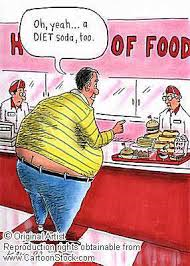In class we discussed the harmful effects of sugary drinks on our health, and the results are very clear that soda is no good for our health. The big soft drink companies are trying to get people to shift to drinking these sugar-free options in lieu of adding taxes to regular sodas. However in areas (Mexico for example) where the sugary drink tax has been placed the amount of soda consumed went down. But do we want to substitute our sugary drinks for diet sodas? Do diet sodas hide just as many adverse health effects, if not more than regular sodas?
Diet sodas have been linked to weight GAIN, diabetes, cardiovascular diseases, depression, and they alter your taste buds. Funny how diet sodas are marketed to help lose weight as a calorie free, sugar-free beverage, but do the COMPLETE opposite. That is because the artificial sugars in diet sodas act just like regular sugars, they activate your insulin, and the excess is stored as fat. Artificial sugars, however absorb into your bloodstream faster than regular sugars, which not only makes mixed drinks with diet sodas more dangerous, but also makes the “sugars” convert into fat more quickly and at a higher quantity. In a study of 6,814 people, daily consumption of diet soda was found to create a 67% increased risk of type two diabetes. In a study of 66,118 women the risk of daily diet soda consumption over 14 years rose their risk of type two diabetes by 112%. As for obesity in a study of 3,682 people, drinking diet soda was shown to DOUBLE the risk of obesity. Artificial sweeteners have also been show to increase appetite and food intake, which could be psychological, because since you aren’t drinking calories, you think you can eat more.
If the data above showing that diet soda is just as bad as regular soda for your health, with the same health risk outcomes that come from weight gain, then take a look at the main ingredients in diet soda. The artificial sweetener used in all diet sodas, aspartame, has dreadful side effects. Aspartame has been linked to small effects such as allergic reactions, and headaches, to weight gain and cancer. Aspartame is made up of three chemicals, methanol (wood alcohol,) phenylalanine, and aspartic acid; each of which has its own unique bad effects on the human body. Aspartic acid, in excess, acts as a neurotoxin, and kills neurons in the brain by allowing an influx of calcium to those cells. This excess of neurotoxins can cause a variety of health problems like sleeping and vision problems, dementia, Alzheimer’s, and epilepsy. Phenylalanine acts as a toxin in excess as well by decreasing levels of serotonin (a chemical that helps regulate mood) in the brain. This causes mood swings, depression, and anxiety. Methanol is the worst of the three components of aspartame. When methanol is ingested it turns into formaldehyde (that’s right the stuff we use to embalm bodies,) which can be a deadly toxin if too much is ingested. The FDA recommends no more that 7.8mg of methanol a day (as it is found naturally in extremely small amounts in some foods,) in one liter of diet soda there are 56mg of methanol. The consumption of methanol has also been linked to retinal damage, blindness, birth defects, the formation of brain tumors, and cancers such as leukemia, multiple myeloma and non-Hodgkin’s lymphoma, blood, breast, and colon cancers.
After researching this topic I think it is clear to say that no one should ever drink diet soda, and made me grateful my parents never let me drink it so I never gained a taste for soda. Diet sodas are definitely no substitute for regular soda, and seem to be in fact, worse for you. I think for now I will stick to good old water.
Sources:
http://www.health.com/health/gallery/0,,20739512_6,00.html
http://authoritynutrition.com/why-is-diet-soda-bad-for-you/
http://articles.mercola.com/sites/articles/archive/2011/11/06/aspartame-most-dangerous-substance-added-to-food.aspx























